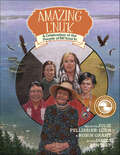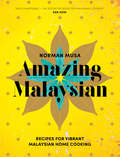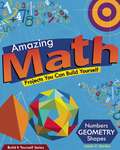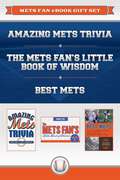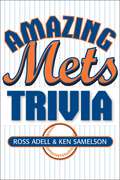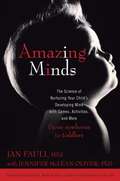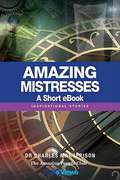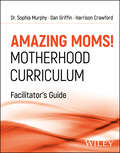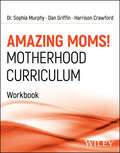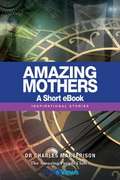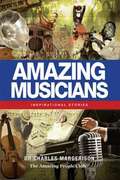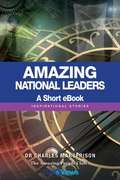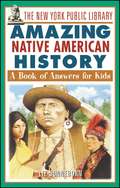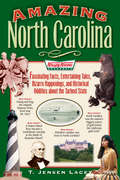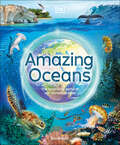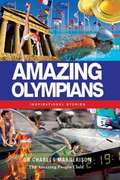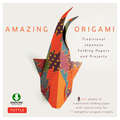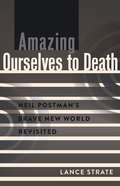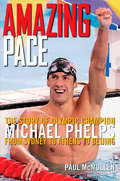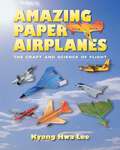- Table View
- List View
Amazing L’nu’k: A Celebration of the People of Mi’kma’ki
by Julie Pellissier-LushDelve into the uplifting stories of the people of Mi’kma’ki in this full-colour illustrated book. Meet a devoted water protector, learn about a teen determined to shed light on the tragic history of Residential Schools, and discover poets who use words to explore and champion the rich Mi’kmaw culture. From Grand Chief Gabriele Sylliboy and Elder Dorene Bernard to Rebecca Thomas and Landyn Toney, all of these amazing people call Mi’kma’ki (a territory that includes New Brunswick, Prince Edward Island, Nova Scotia, and parts of Newfoundland, Quebec, and Maine) home. With dozens of profiles featuring artists, athletes, entrepreneurs, scientists, and more—both historical and present-day, from kids to Elders—Julie Pellissier-Lush and Robin Grant celebrate the many brilliant achievements of the Mi’kmaq. Includes original colour illustrations by James Bentley, informative sidebars, a map of Mi’kmaw territories, a history of Mi’kma’ki , an index, and a glossary.
Amazing Magical Jello Desserts
by General Foods CorporationThis is a book about magic and making magic--the magic of your family having fun together, building memories and traditions. And, we know you'll agree that it's fun to make magic both for and with your children with the exciting Jell-O brand dessert recipes in this book. Do you remember the first thing that you cooked and what fun it was? Maybe it was cookies or popcorn. Probably it was Jell-O brand gelatin. Remember stirring the red powder very carefully with your wooden spoon until it was all dissolved? What magic! Millions of children first cooked by helping their mothers make Jell-O brand gelatin and pudding. Now, you find yourself teaching many of the same things to your children. This book was written to help you carry on that tradition.
Amazing Malaysian: Recipes for Vibrant Malaysian Home-Cooking
by Norman MusaMalaysian food is incredible. Think vibrant, healthy dishes with dazzling flavours and textures. With over 100 recipes - using ingredients that you can find in any supermarket - this is the ultimate guide to cooking Malaysian food at home. Try an authentic satay, an aromatic curry, a laksa, or simply the perfect fluffy coconut rice.
Amazing Math Projects
by Samuel Carbaugh Lazlo C. BardosMake a geodesic dome big enough to sit in. Solve one of the world's hardest two-piece puzzles. Pass a straight line through a curved slot.From prime numbers to paraboloids, Amazing Math Projects You Can Build Yourself introduces readers ages 9 and up to the beauty and wonder of math through hands-on activities. Kids will cut apart shapes to discover area formulas, build beautiful geometric models to explore their properties, and amaze friends with the mysterious Möbius strip.Learning through examples of how we encounter math in our daily lives, children will marvel at the mathematical patterns in snowflakes and discover the graceful curves in the Golden Gate Bridge. Readers will never look at soap bubbles the same way again!Amazing Math Projects You Can Build Yourself includes projects about number patterns, lines, curves, and shapes. Each activity includes intriguing facts, vocabulary builders, and connections to other topics. A companion website, includes video instructions for many projects in the book and provides additional activities.
Amazing Mathematicians - A Short eBook
by Charles MargerisonMathematics is the science of numbers. However, have you ever stopped to ask - who are the people behind the amazing formulas that have helped mankind find solutions to everyday probabilities? The Amazing People Club invites you to explore the exciting world of five amazing mathematicians. Their inspirational stories were not always about number crunching as we know it, as they strived in the search for 'truth' via theory. Gain an insight into how George Boole was inspired to combine logic with mathematics to reduce risks, developing calculations that although complex, enabled people to make better judgements. Immerse yourself in the life of Ada Lovelace, the "Enchantress of Numbers". Her intellect and skill in mathematics led to her developing a plan for calculating sequence, which is now recognized as the first computer program. Be inspired by the genius minds of Rene Descartes, Carl Gauss and Alan Turing, whose skills within mathematics, science and technology have formed the basis for how we still assess probabilities and find solutions to this very day. Each story comes to life through BioViews®. These are short biographical narratives, similar to interviews. They provide an easy way of learning about amazing people who made major contributions and changed our world.
Amazing Mets Fan eBook Gift Set
by Taylor Trade PublishingMatt Harvey is getting healthy. The young pitching staff looks ready from prime time. Even Mr. Met is holding his head a little higher these days. This eBook Gift Set is the just the thing every Mets fan needs. Each book highlights only the best of the Mets throughout baseball history. This set includes Amazing Mets Trivia, Mets Fan's Little Book of Wisdom, and Best Mets. From trivia to tips and best-kept secrets, these books are fast paced and exciting (even when the team wasn't).
Amazing Mets Trivia
by Ken Samelson Ross AdellBorn out of expansion in 1962, the New York Mets have more than filled the void left by the departure of the Brooklyn Dodgers and New York Giants. They have provided baseball fans in New York and around the baseball world with close to 40 years of memories including Casey Stengel's loveable losers, the improbable 1969 miracle, another world championship in 1986 and National League pennants in 1973 and 2000 with many unforgettable moments in between. Amazing Mets Trivia tests the memories of Met fans of all ages with hundreds of questions and facts about players including: Tom Seaver, Cleon Jones, Willie Mays, Rusty Staub, Dave Kingman, Lee Mazzili, Darryl Strawberry, Doc Gooden, Keith Hernandez, Gary Carter, Mike Piazza, Edgardo Alfonzo, John Franco and many others.
Amazing Millionaires - A Short eBook
by Charles MargerisonYou may know the names of famous millionaires and wonder how they struck it rich. This unique collection of short audio stories from The Amazing People Club tells their tales. It explores the lives of four amazing millionaires and follows them on their amazing journeys to fame and fortune. Meet Cesar Ritz, the man behind the term 'Ritzy', whose life was just that. He came to be known as the 'king of hoteliers, and hotelier to kings'. Also, meet the man behind the Nobel Prizes. Alfred Nobel's life, often shrouded in mystery, comes to life through his BioViews® as we explore his career as a chemist, engineer, innovator, and armaments manufacturer. Unknown to many people, he actually invented dynamite! Meet Howard Hughes - aviator, engineer, industrialist, film producer, film director and philanthropist who became who became one of the wealthiest people in the world. Another fascinating character is Henry Wellcome. He may have saved your life with the medicines he produced. The Wellcome Trust is one of the largest medical charities in the world. Each story is unique and amazing and could perhaps be just what you need for inspiration to achieve your own ambitions. Each story comes to life through BioViews®. These are short biographical narratives, similar to interviews. They provide an easy way of learning about amazing people who made major contributions and changed our world.
Amazing Minds
by Jan Faull Jennifer Mclean OliverA noted parenting expert provides the latest research on child development and offers games and activities parents can use to support their child's natural abilities. Drawing on the latest fascinating research in child brain development, noted parenting expert Jan Faull gives parents the essential tools to recognize and encourage their child's natural development- and have fun with their kids in the process. Simple to use and easy to understand, the techniques in Amazing Minds show parents how to support their children's capacity for learning. Faull describes chronologically what babies are capable of and the research behind those findings-then provides clear instruction, practical exercises, and fun games to play with babies to enhance their innate learning process. Amazing Minds will change how people view babies-from newborns to toddlers- and foster a new level of nurturing for generations of parents, educators, and caregivers.
Amazing Mistresses - A short eBook
by Charles Margerisonratives, similar to interviews. They provide an easy way of learning about amazing people who made major contributions and changed our world.
Amazing Moms! Motherhood Curriculum, Facilitator's Guide
by Dan Griffin Harrison Crawford Sophia MurphyA transformative, 19-session workshop that helps moms build the skills and self-confidence to become the best mothers they can be Trauma is widely prevalent among parents, and it can affect mothers’ ability to form healthy relationships with their children. Amazing Moms! is the first thoroughly trauma-informed curriculum designed specifically to help mothers unpack their personal histories and learn techniques for becoming better parents. Covering an unusually broad list of topics, from emotional regulation and discipline to families of origin and societal expectations of mothers, the sessions create opportunities for interactive learning and personal growth. Amazing Moms! accommodates all learning styles and includes activities to help create a trusting atmosphere where participants feel safe opening up and engaging with the material. The curriculum also features: Small group activities, grounding exercises, and participant-led lessonsActivities that incorporate art, physical movement, roleplays, and between-session exercisesPractical skills and tools mothers can use with, and teach to, their childrenEnhanced communication skills for healthy conflict resolutionA candid discussion of sex, sexuality, and intimacy, and how to begin having healthy dialogue about these topics with childrenStrategies for finding balance and prioritizing self-careExploration of the changing roles and expectations of women and mothers, woven throughout the sessions Based on current scientific evidence and developed by leading researchers and practitioners in the field, Amazing Moms! offers a unique perspective on motherhood, connecting participants with themselves so they can better connect with their children. Amazing Moms! is both inspired by and a companion to the Amazing Dads! Curriculum.
Amazing Moms! Motherhood Curriculum, Workbook
by Dan Griffin Harrison Crawford Sophia MurphyThe first gender-responsive, trauma-informed curriculum designed specifically for mothers Amazing Moms! Motherhood Curriculum consists of 16 two-hour, co-facilitated sessions that include activities, exercises, and experiential opportunities. The goal of the workshop is to help participants create a vision of the mothers they want to be and to provide them with the awareness, tools, and confidence to achieve that vision. By encouraging participants to connect with the content on a personal level, the curriculum helps mothers enhance their relationships with their children and other family members. The Amazing Moms! program—including a Facilitator's Guide and Participant Workbook—goes beyond other parenting curricula, addressing the complex intersection of female socialization, childhood and adolescent trauma, and relational struggles that can come between mothers and their children. It covers a broad range of topics, including anger and shame, sex and sexuality, discipline, codependency, and self-care. The curriculum will challenge participants and facilitators alike to approach the material with vulnerability to achieve lasting growth. Follow detailed plans for facilitating 16 two-hour sessions on issues related to parenting, designed specifically for mothers Help participants develop self-awareness and understand how their past trauma influences their emotions and behaviors Encourage strong mother–child relationships with skill-building exercises and activities Use techniques to foster safety, trust, openness, and honesty in group settings This curriculum is for all moms, with children of all ages—especially those who have found themselves in child protective services or some other aspect of the child welfare system.
Amazing Mothers - A Short eBook
by Charles MargerisonThe Amazing People Club® brings you a unique collection of eStories which demonstrate the strength of motherhood and the sacrifices that all mothers make; whether personal, political, or financial, to raise their children. This is a must-read for mothers everywhere! Explore the lives of five amazing mothers including Anne Burras, the first colonial mother of America; Queen Victoria, who bore nine children by her beloved husband Prince Albert but saw three of them die during her lifetime; and Lillian Gilbreth who, as well as bearing twelve children, managed to become renowned in the study of ergonomics and human factor engineering. The equally amazing stories of Marie Curie and Susannah Holmes are also included.Journey with them and discover these inspirational stories of motherhood through BioViews® which are short biographical narratives, similar to interviews. These inspirational stories from The Amazing People Club® provide an easy way of learning about amazing people who made major contributions and changed our world.
Amazing Musicians
by Charles MargerisonIt is often said that music is a universal language, and our greatest musicians have succeeded in reaching the stars. Do you dream of following in their footsteps? Take a fascinating trip through the lives of some of the world's most celebrated musicians, and find out what it takes to touch the hearts of millions through music. In this unique collection of inspirational stories from The Amazing People Club, discover the sacrifices John Lennon had to make to realise his dream. Read the story of a poor Jewish boy from the Russian Empire called Asa Yoelson defied prejudice to become Al Jolson, 'The World's Greatest Entertainer'. Find out whether Edith Piaf truly had "No Regrets"! Every successful musician has an incredible story to tell. Join Callas, Piaf, Lennon, Jolson, Sinatra and a host of other influential and talented musicians as they share with you their secrets and invite you on an unforgettable journey through their fascinating musical lives. What is a BioView®?A BioView® is a short biographical story, similar to an interview, about an amazing person. These stories offer an inspirational way of learning about people who made major contributions to our world. The unique format and flow enables each person's story to come alive, as if it is being personally told to you, and reflects their interests, emotions and passions.
Amazing National Leaders - A Short eBook
by Charles MargerisonWhat are the qualities needed for good, effective leadership? What are the characteristics that makes some people natural leaders? Are great leaders born or made? All of these questions and more are answered in this unique collection of eStories, as amazing national leaders from history guide us through their incredible lives. Learn about their strengths and weaknesses, triumphs and failures.Exploring Catherine the Great's revitalization of Russia, Ghandi's successful non-violence agenda, Napoleon's great victories and devastating defeats, Queen Elizabeth I's Golden Age and George Washington's election as the first President of the United States, we can learn so much from them and be inspired by each and every one.The Amazing National Leaders stories come to life through BioViews® which are short biographical narratives, similar to interviews. These inspirational stories from The Amazing People Club® provide a new way of learning about amazing people who made major contributions and changed our world.
Amazing Native American History: A Book Of Answers For Kids
by Liz Sonneborn New York Public Library StaffDiscover how a game of lacrosse led to a victory for the Ojibwa tribe against the British, find out why the Menominees are called the wild rice people, and meet some of the great heroes of Native America, from Sequoyah and Sitting Bull to Pocahontas. Enjoy the holidays, foods, dances, and stories of these diverse peoples and find the answers to all your questions about Native American history. . . . Why did the Mound Builders build mounds? See page 14. What was the Trail of Tears? See page 59. Why didn′t Montezuma attack Cortes′ men? See page 27. Who were the Navajo Code Talkers? See page 94. What was the Alcatraz takeover? See page 107. What was the Iroquois confederacy? See page 33. Did all Inuit live in igloos? See page 131. What were the Mayans′ greatest scientific achievements? See page 21.
Amazing North Carolina
by Theresa Jensen LaceyAmazing North Carolina offers a rare glimpse into unusual and sometimes bizarre people and events in North Carolina's 200-year history. Reading like the Tarheel State's own version of Ripley's Believe It or Not, this book explores hundreds of incredible stories, facts, and tidbits of human interest. It contains pictures, quizzes, trivia, stories, sidebars, lists, and more. Read about . . . How Lizard Lick, Cat's Square, Boogertown, and Rabbit Shuffle got their namesRobert Null, who invented a UFO detectorThe Civil War battle where the Confederates fought without clothes onChang and Eng, the original "Siamese twins" who settled in Wilkesboro and married local sisters Sarah and Adelaide YatesThe strange story of Goat-Gland Binkley, who operated in North Carolina 75 years before ViagraThe annual Bald is Beautiful convention in Morehead CityThe world's largest twins (at 800 pounds each)The road that goes nowhereSenate Bean Soup, the secret of Jesse Helms' longevity (recipe included)
Amazing Oceans: The Surprising World of Our Incredible Seas (DK Amazing Earth)
by Annie RothGo on an underwater adventure in this detailed look at our oceans&’ most fascinating places, plants and animals.This fascinating book will take children beyond the seaweed, sharks, and shells that you have seen many times before, and show you the secret world that lies in and around our amazing oceans. This ocean book for children aged 7-9 delves into facts about our marine environments that most people don&’t know. Dive into the deepest sea trench ever discovered, marvel at immortal anemones, and learn how devastating water tornadoes form. Kids can ponder at a whole range of topics, from unique ocean habitats, newly-discovered creatures, marine mysteries, and the exciting world of ocean exploration.This educational ocean book for kids offers: Enticing information on the most incredible ocean features, explaining how they work, why they are unusual, and what is amazing about them.Detailed diagrams, maps and charts that bring the beauty, science or geography of each topic to life.Spectacular photography, including incredible satellite images and mind-boggling microscope photos, to maximize the impact of each topic.Have you ever wondered how big the oceans actually are? Or how animals communicate in the water? Or how plants are able to grow in the sea? This book answers those questions, and many, many more. Amazing Oceans is the ideal book for inquisitive kids aged 7 and above, and especially those with a passion for wildlife, science, or geography. With in-depth information, vivid photographs and illustrations, children can get to know the most incredible environments on Earth.
Amazing Olympians
by Charles MargerisonThere is no event like the Olympic Games. The athletes who compete are amazing in their ability to attain world class standards and their drive to be the best as they strive to beat their competitors and defy physical limitations and records on a global stage. These individuals are an example to all of us, and each of the Amazing Olympians in this book has an amazing story to tell. In this unique story collection, take a fascinating trip through the lives of some of the world's most celebrated Olympians! You'll meet Fanny Blankers-Koen, 'the flying housewife', who had great success as an athlete in the face of prejudice against her age and her refusal to conform. You'll discover the story of George Eyser, who overcame the loss of his leg in an accident, going on to win six medals in a day. Meet Jesse Owens, the most successful athlete of the 1936 German Olympics who was snubbed by Adolf Hitler because of his colour, and Johnny Weismuller, who went from Olympic success to a career in Hollywood. Join all these inspirational Olympians, and many others, as their stories come to life through BioViews®.A BioView® is a short biographical story, similar to an interview, about an amazing person. These stories offer an inspirational way of learning about people who made major contributions to our world. The unique format and flow enables each person's story to come alive, as if it is being personally told to you, and reflects their interests, emotions and passions.
Amazing Origami
by Tuttle EditorsOrigami paper with stunning Japanese traditional prints and fun and simple folding instructions!Amazing Origami is designed for origami paper folders of all ages and all skill levels-from novices up to more experienced folders. It provides everything you need to create exciting and original origami art. The gorgeous folding papers feature delicate patterns with gold detailing, recalling the one-of-a-kind traditional designs used in the Japanese kimono fabrics from a bygone era.This origami ebook contains: A full-colored 64-page booklet Clear step-by-step instruction and diagrams 17 fun-to-do projects Downloadable folding sheetsOne of the wonderful aspects of origami is it's simplicity. The paper folder needs nothing more than something to fold-no glue, no tape, no string or wire-just a piece of paper! Though the materials are simple, origami exemplifies the ability of the human mind to solve problems and create beautiful harmony. Origami is relaxing and peaceful, but it is also fun and exciting to discover new ways to fold paper. With Amazing Origami's simple instructions, origami beginners will be able to get started immediately. With the beautiful, Japanese origami paper, experienced paper folders can create unique origami art.Origami projects include: Luna Moth Tortoise Carp Leaf Peacock Butterfly Koi Chinese Pinwheel And many more...
Amazing Otters
by M. Barbara BrownellIntroduces in text and illustrations, the physical characteristics, habits, and natural environment of the otter
Amazing Ourselves to Death: Neil Postman's Brave New World Revisited (A Critical Introduction to Media and Communication Theory)
by Lance StrateNeil Postman's most popular work, Amusing Ourselves to Death (1985), provided an insightful critique of the effects of television on public discourse in America, arguing that television's bias towards entertaining content trivializes serious issues and undermines the basis of democratic culture. Lance Strate, who earned his doctorate under Neil Postman and is one of the leading media ecology scholars of our time, re-examines Postman's arguments, updating his analysis and critique for the twenty-first-century media environment that includes the expansion of television programming via cable and satellite as well as the Internet, the web, social media, and mobile technologies. Integrating Postman's arguments about television with his critique of technology in general, Strate considers the current state of journalism, politics, religion, and education in American culture. Strate also contextualizes Amusing Ourselves to Death through an examination of Postman's life and career and the field of media ecology that Postman introduced. This is a book about our prospects for the future, which can only be based on the ways in which we think and talk about the present.
Amazing Pace: The Story of Olympic Champion Michael Phelps from Sydney to Athens to Beijing
by Paul McmullenA vibrant portrait of American swimmer Michael Phelps—the dominant athlete at the 2004 Olympics—who has relentlessly pushed himself, promoted his sport, and appears poised to ultimately accumulate the most gold medals in Olympic historyBefore he was old enough to have a driver's license, Michael Phelps had a world record. Before he ever took a college class or turned 20, he had earned distinction by winning 8 medals—6 gold and 2 bronze—at the Athens Olympics, the most in non-boycotted Games. Along the way, he captivated an American television audience and confounded the critics who questioned his ambition.Amazing Pace:• provides the most revealing look yet at a young man who became a world-class athlete before he had the chance to grow up—by respected Baltimore Sun journalist Paul McMullen, who followed Phelps's rise from an obscure 14-year-old to the most scrutinized competitor at the world's biggest sporting event• details the plotting of his career, from turning professional at age 16, to the management of the first crises he encountered Paul McMullen's 5 years of observation add dramatic context to the life of a young athlete whose rise to prominence coincided with the tumult of the first Summer Olympics after 9/11. No Olympian has ever earned 10 gold medals in a career, but Michael Phelps is on pace to achieve that milestone at the 2008 Games in Beijing, China.
Amazing Paper Airplanes: The Craft and Science of Flight
by Kyong Hwa LeeIn this book Kyong Hwa Lee combines the art of origami and the science of flight to create unique paper airplane designs for aviation enthusiasts of all ages. Featuring thirty-two designs, Amazing Paper Airplanes showcases models resembling real-world aircraft, including the F-22 fighter jet, a P-51 World War II plane, the Convair F-102 Delta Dagger—the first supersonic delta-wing interceptor airplane of the US Air Force—and more. For these models, Lee provides information along with an image of the real plane to encourage interest in aerospace technology. Every design has been flight-tested and presents complete step-by-step folding instructions. In addition to showing basic and advanced folding techniques and providing templates for each plane, the author explains the theory behind flight and offers tips to fine-tune paper airplanes for optimal flying.
Amazing Peace: A Christmas Poem
by Maya Angelou Steve Johnson Lou FancherIn this beautiful, deeply moving poem, Maya Angelou inspires us to embrace the peace and promise of Christmas, so that hope and love can once again light up our holidays and the world. "Angels and Mortals, Believers and Nonbelievers, look heavenward," she writes, "and speak the word aloud. Peace."Read by the poet at the lighting of the National Christmas Tree at the White House on December 1, 2005, Maya Angelou's celebration of the "Glad Season" is a radiant affirmation of the goodness of life and a beautiful holiday gift for people of all faiths.From the Hardcover edition.
